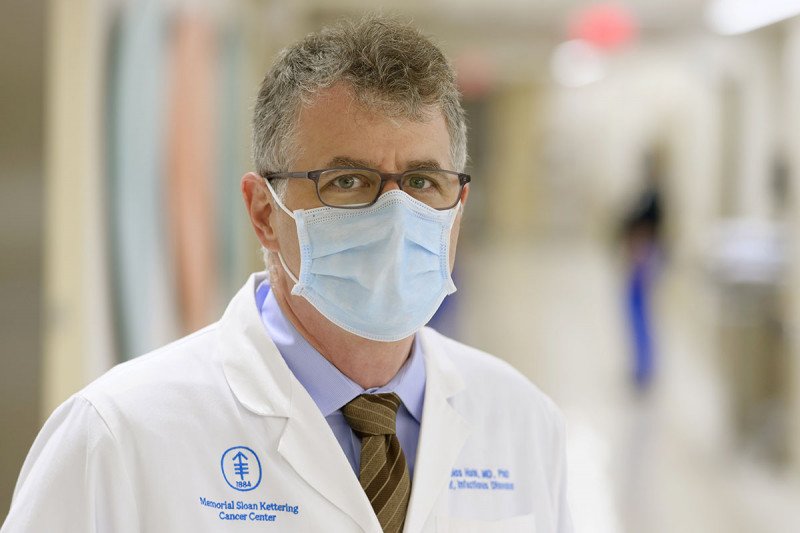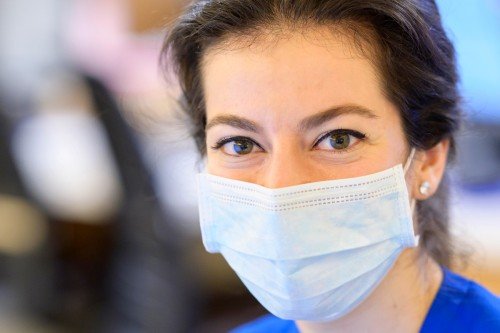
Infectious disease specialist Tobias Hohl says antibody testing helps experts estimate what percentage of the population may have developed immunity to a virus.
Tests for COVID-19 antibodies are beginning to play a role in determining who has had the infection as well as calculating the prevalence of the disease. We asked Tobias Hohl, Chief of Memorial Sloan Kettering’s Infectious Diseases Service, to explain what these tests mean for people with cancer and the general public.
How do COVID-19 antibody tests work?
Humans make different types of antibodies in response to an infection. The COVID-19 antibody tests being used now look for IgG antibodies, which develop one to two weeks after infection and stay present in the body for months or years. The antibody tests work best if given several weeks after someone has recovered from severe COVID-19 illness. Antibodies to the SARS-CoV-2 virus — which causes COVID-19 — may not yet be present when a patient first has symptoms.
It’s important to understand that antibody tests detect a person’s immune response to an infection. Other COVID-19 tests look for the presence of the virus itself. Those tests can tell you if someone has been infected but not whether there has been an immune response.
What does it mean if someone tests positive for COVID-19 antibodies?
It means there is a pretty high likelihood the person was infected with COVID-19 and that their body mounted an immune response. The antibody tests are not perfect, but they appear to have an accuracy rate of around 80% to 90%. Beyond that, we are unsure whether it means you are protected against infection in the future. Most infectious disease specialists believe patients will be partially immune, if not fully immune, for an unknown period. Research is ongoing to get a clearer picture of this. We don’t want people who test positive for antibodies to think they are invulnerable and abandon handwashing, social distancing, and other measures that limit the spread of infection.
Are there any special issues for people with cancer getting a COVID-19 antibody test?
There is no danger for a person with cancer to be tested for antibodies, which is done from a blood draw. People with cancers of the blood and bone marrow, such as lymphomas, myelomas, and leukemias, may not be able to mount a strong antibody response to the COVID-19 virus. This is because they are often treated with drugs that kill off their white blood cells, including those that make antibodies. At MSK and elsewhere, scientists are studying whether the COVID-19 antibody response is impaired in these patients. If so, the antibody test might not work as well. For people with solid tumors, such as breast, lung, and colon cancers, we generally do not believe that cancer treatments will substantially impair the antibody response or affect the antibody test.
As a rule of thumb, we don’t give treatments like chemotherapy when a patient with cancer has an active infection. This would include COVID-19. We delay chemotherapy to give the patient time to recover. When they are well, we want them to resume their therapy as soon as possible. We also don’t think that the presence of COVID-19 antibodies will interfere with the effectiveness of cancer treatment.
Can I get COVID-19 antibody testing at MSK?
Our primary obligation is to our patients and employees. Our COVID-19 antibody tests are available to them, but we are limited in the number of tests that can be performed. For those in the general public who are interested, the COVID-19 antibody tests are commercially available now, and I expect they will become easier to access in the next few months. People should speak with their primary care physician about whether they should be tested.
What role does an antibody test play in containing COVID-19 infection?
From a public health standpoint, we want to have enough of the population be immune from the virus so that it cannot spread anymore and instead dies out. This is known as herd immunity. There are two ways we can reach herd immunity: through people who have been exposed to the virus and have recovered, and through the development of a COVID-19 vaccine. The view of many health officials is that if about two-thirds of the population becomes immune to the COVID-19 virus due to vaccination or to prior exposure, the virus is likely going to fizzle out because it can’t find enough new vulnerable hosts to maintain a transmission chain.
Antibody testing can help us get an idea of how close we are to herd immunity based on the percentage of the population that tests positive. We are still a long way from herd immunity. That’s why it’s so important to continue doing what we can to limit its spread.
September 23, 2020

